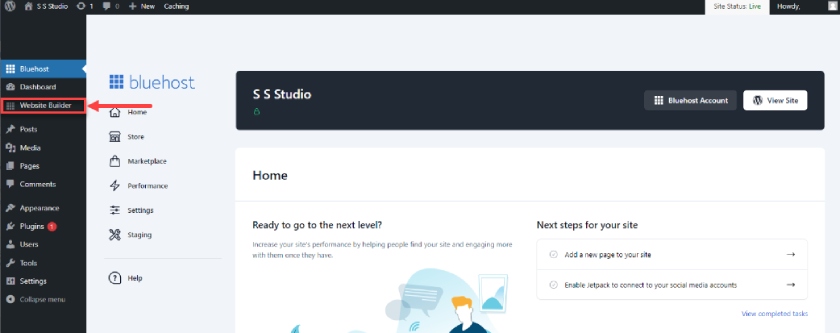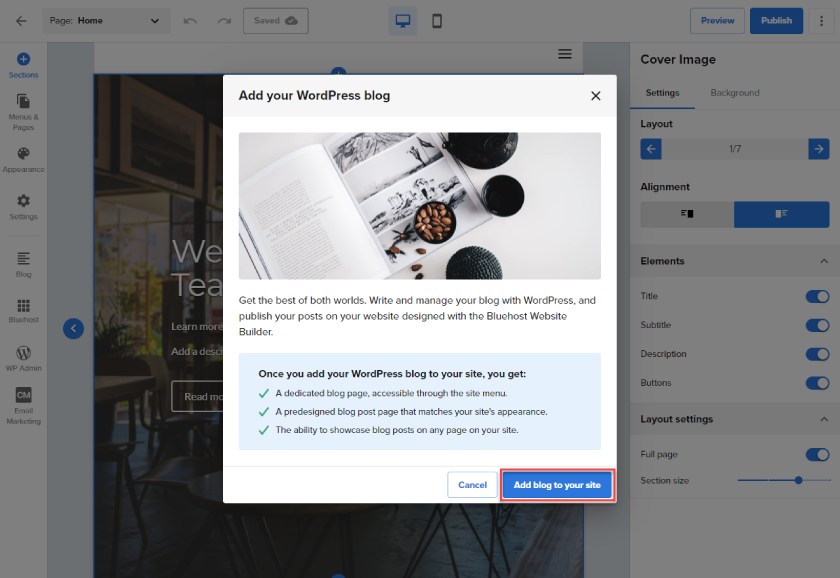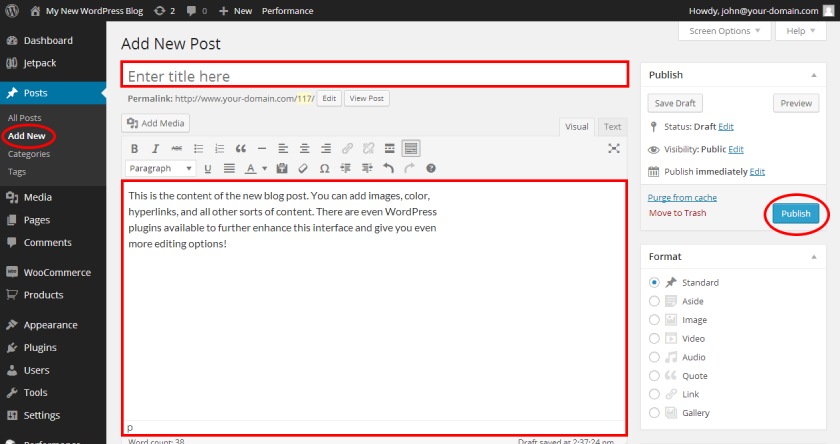When comparing Squarespace to WordPress, there are a few factors to keep in mind (i.e., pricing and functionalities). WordPress is a standalone content management system (CMS) with unlimited customization options but a steep learning curve. Meanwhile, Squarespace is a complete hosting, website, and ecommerce solution with some CMS capabilities. Anyone can build a beautiful, full-featured website easily with Squarespace.
Squarespace’s robust set of features, ease of use, and professional look make it the best choice for building most small business websites without significant technical expertise or the need for a very scalable and continuously growing website. WordPress is best for anyone who needs a more advanced CMS.
However, we wanted to do more of an apples-to-apples comparison of Squarespace vs WordPress. So instead of comparing the basic, off-the-shelf WordPress, we compare Squarespace to WordPress, as offered by the hosting company Bluehost. Using WordPress with Bluehost gives you a comparable pricing structure and the WonderSuite set of tools, which levels the ease-of-use playing field between the two solutions.
- Squarespace: Best for stylish and full-featured business websites, especially for beginners
- WordPress: Best for large-scale content management and more advanced tools
Squarespace vs WordPress: Side-by-side Comparison
We’ve compared these two website-building platforms based on features, benefits, and pricing. We also offer a quick rundown of when to use one versus the other.
Best for Pricing & Value: WordPress
WordPress is open-source and free to download but requires hosting to install and use. Again, for comparing Squarespace versus WordPress here, pricing for WordPress is based on Bluehost and its WordPress builder and hosting plans.
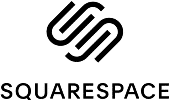 |  via | |
|---|---|---|
Free Plan | ✕ | ✕ |
Paid Plans | Personal: $16/mo* Business: $23/mo* Commerce (Basic): $28/mo* Commerce (Advanced): $52/mo* Plus the cost of your domain after the first year *Billed annually | Basic: $2.95/mo Choice Plus: $5.45/mo Online Store: $9.95/mo Pro: $13.95/mo Plus the cost of your theme, plugins, and domain after the first year |
Renewal Cost | Same as the startup cost | Basic: $11.99/mo Choice Plus: $21.99/mo Online Store: $26.99/mo Pro: $28.99/mo |
Bluehost offers a very competitive start-up cost structure, which increases in the second year. Squarespace is more “what you see, what you get,” so the pricing doesn’t change and is fairly all-inclusive. With WordPress, much of the functionality required will be added through third-party plug-ins and integrations, which add costs.
If you’re willing to go totally commando DIY with WordPress from WordPress.org, all bets are off. WordPress itself is a free, open-source app, but your choice of web host will drive your costs followed by your plugins and integrations, which can quickly add up. This route is definitely not for the faint of heart and requires significant technical expertise and confidence. However, functionality-wise, it’s a clear winner. WordPress isn’t the industry leader for building websites for no reason.
Winner: WordPress. If you’re willing to customize, WordPress through Bluehost is still an excellent value, even adding a significant number of third-party plug-ins.
Best for Design & Ease of Use: Squarespace
 |  via |
|---|---|
|
|
For most small business owners, ease of use is a significant factor in picking a website builder unless you need fairly robust capabilities and customizations, good technical skills, and time to manage your website.
Squarespace is known for its ease of use and the ability to start with curated, award-winning templates, so the sacrifice is small. With this ease of use, however, there are some compromises in its design flexibility. The drag-and-drop editor limits your ability to move and precisely position elements. The grid-based editor helps ensure the alignment of elements but doesn’t allow total pixel-by-pixel flexibility.
WordPress gives you almost infinite flexibility, with a vast library of themes (templates), compared to 150 or so from Squarespace. Furthermore, WordPress lets you use its wide range of third-party plug-ins and integrations to add virtually any functionality or widget you need.
Squarespace offers quite a bit of functionality right out of the box. With the right plan and a few select plug-ins, it’s very easy to achieve almost all of a small business owner’s functional needs. The cost may be slightly higher than WordPress, but it’ll be more predictable and less of a DIY factor.
Winner: Squarespace. When choosing between Squarespace or WordPress, the former gains the edge for its simplicity and extensive, out-of-the-box feature set, especially for small business users.
Best for Blogging: WordPress
 |  via |
|---|---|
|
|
No comparison of WordPress vs Squarespace would be complete without specifically calling out their relative capabilities as blogging platforms. WordPress is, by its very nature, a CMS with very robust multiuser features for managing a large body of content.
If you are a small business owner, looking to write an occasional (weekly or monthly) blog post to engage your customers, possibly with some social media or email syndication capabilities, Squarespace is perfectly adequate. It easily lets you build and publish blogs with ready-made blog templates that match your site. You can even add images, videos, galleries, and social media share buttons.
Meanwhile, if content development is core to your business, as it is here at Fit Small Business, a flexible and robust platform like WordPress allows you to manage an almost infinite number of contributors and content pieces. There’s almost no limit to what you can do. But it’s also much more complex than Squarespace, so it will likely require a lot of training to familiarize yourself with WordPress’s interface. Or you’ll need to hire a WordPress specialist.
If you’re setting up WordPress through Bluehost, however, you benefit from a much more user-friendly experience and interface than off-the-shelf WordPress using the WonderSuite set of tools to develop and manage your blog.
Winner: WordPress. If blogging is a key part of your business strategy, WordPress definitely beats out Squarespace.
Best AI Tools: Squarespace
Most website-building tools on the market today include at least some basic AI features—WordPress and Squarespace are no exception. The most common of these are basic site setup tools that ask a series of questions about the brand, business, style, and tone to create a website framework. The second most common feature uses AI to help generate written content not unlike Writesonic, ChatGPT, and other AI content generation tools.
Squarespace provides integrated AI tools like the Squarespace Blueprint AI, which automates layout design through prompts to help users rapidly create a professional-looking website skeleton. It also includes basic AI for photo editing but not image generation. WordPress requires plug-ins to integrate capabilities similar to Dall-E or Canva.

Squarespace’s recently launched AI website generator lets you build a fully branded website from a few prompts.
When you compare WordPress and Squarespace, hosting with Bluehost makes a major difference. While WordPress itself is not designed to set up and build sites with AI assistance natively, the Bluehost WonderSuite AI toolset offers this capability to WordPress users. WonderStart, as its name implies, will kick it off by asking questions and then recommending themes, plugins, and layouts based on your responses.
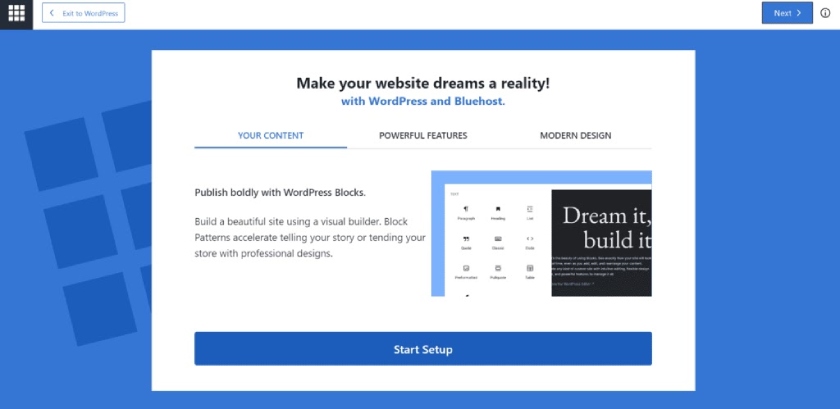
WonderSuite from Bluehost makes the process of starting a website easier with its AI tools.
The two platforms offer AI-powered text generation tools—in WordPress through plug-ins, such as Jetpack AI, or using Bluehost’s writing assistant. Squarespace matches this functionality but also offers the ability to specify short, medium, or long text and set the tone based on brand guidelines.
Both tools also offer SEO, analytics, and ecommerce tools, including the ability to offer AI-based product recommendations and email marketing automation. However, Squarespace lacks more sophisticated product recommendations, personalized shopping experiences, and dynamic WordPress and WooCommerce product suggestions.
Squarespace has continued to expand its offerings of AI-assisted tools, especially ecommerce tools, in its most recent product update. WordPress offers many of these capabilities and more through its extensive third-party integration ecosystem. Still, emphasizing simplicity, Squarespace offers the most out-of-the-box AI capabilities, even considering Bluehost’s WonderSuite.
Winner: Squarespace. When you compare Squarespace and WordPress, the direct integration and usefulness of these tools are paramount, and Squarespace takes the cake.
Best Ecommerce Features: Tie
 |  via |
|---|---|
|
|
Setting up an online store is not the easiest thing in the world. A ton of organizational effort goes into setting up your catalog, payments, shipping methods, and inventory management. This is especially true with an extensive product selection. Here, the tension between ease of use and scalability is most dramatic.
It’s hard to look at Squarespace vs WordPress without considering its essential ecommerce sidekick, WooCommerce, as part of the ecommerce package. While WordPress with WooCommerce would run away with the title of best ecommerce platform overall, considering the needs of small and medium-sized businesses (SMBs) as we are here, the simplicity of Squarespace and its flexibility for merchandising products and services stand out.
If your SMB has a very extensive product collection or uses drop shipping and international commerce, then WordPress is worth a second look. But for more pure, serious ecommerce, you may also look at a solution such as Shopify.
Winner: Tie. So is WordPress better than Squarespace for ecommerce? In a pure sense, WordPress would be the ecommerce champ. But considering the needs of our audience, we have to call this one a draw.
Best for SEO & Marketing: Squarespace
When it comes to marketing tools, Squarespace and WordPress are often in a neck-and-neck race. This is because while Squarespace offers all the basic marketing tools built-in, WordPress has thousands of plugins to choose from, but it’s also more complicated to navigate. We’ve broken down our comparisons by SEO and marketing tools.
Having a giant product catalog and getting it out in front of customers are two very different things. In terms of our off-the-shelf comparison of these solutions, we’ll soon see that Squarespace is a contender for all-around integration of SEO, marketing, and social sharing.
 |  via |
|---|---|
|
|
So WordPress and Bluehost are more advanced than Squarespace in terms of the possible offerings of SEO tools. Then how does Squarespace win here? Well, SEO, unlike many other aspects of web development, is a very advanced discipline that requires disproportionate attention and expertise to execute well.
As a small or medium-sized business owner, it’s generally recommended that you dial in the basics of site optimization, but with the day-to-day operations of a business, you probably don’t want to go down the SEO rabbit hole. Squarespace offers that essential toolbox without sending you down endless aisles at the hardware store.
 |  via |
|---|---|
|
|
Are you noticing a theme here? When evaluating a particular software solution here at Fit Small Business, it’s always a balancing act to evaluate a self-contained software package totally on its own merits versus the third-party ecosystem. But again, for small business owners, simplicity and integration are key.
For email marketing, Squarespace offers a fairly complete and robust set of tools to create, schedule, and automate your email campaigns. In addition, these emails can tie directly into your blog or social media campaigns right in the platform.
With Squarespace’s Unfold app, you’ve got a mini-social video production studio right there in your pocket, giving you curated templates, a brand kit, effects, and music to rapidly generate edgy and cool social media posts. Biosites is a fairly unique feature within Squarespace, allowing you to create special landing pages that connect directly to your social media accounts and help build your brand presence.
WordPress and Bluehost’s ecosystem once again offers a megamall of great plugins. Squarespace is known for being cool and beautiful and, in my opinion, packages all of this beautifully in its marketing suite. In addition, what Squarespace lacks in potential powerful plugins makes up for awesome go-to features that even help set beginners up for marketing success.
Winner: Squarespace. So is Squarespace or WordPress better for marketing? Squarespace takes the title even though it gives you limited tools compared to WonderSuite or other possible plug-ins. It may offer a toolset with some constraints compared to the WordPress third-party universe, but it feels more like a red carpet rather than guardrails.
Best for Customer Support & Resources: Tie
 |  via |
|---|---|
|
|
Without Bluehost, WordPress.org users are typically consigned to online support documentation, community forums, and paid support services from third parties. With Bluehost, users can be assured of a fairly high level of support, including phone and 24/7 chat.
Squarespace is more limited, with no phone support and only live chat during extended EST hours. However, its excellent Help Center makes up for some of this with its excellent and more visually robust tutorials. It also seems to get higher marks from consumer review sites for its response times.
Winner: Tie. Overall, it’s a wash, with both providers having strengths and weaknesses in delivery and quality of execution for their support services.
Best for Security: Tie
 |  via | |
|---|---|---|
Secure Sockets Layer (SSL) Certificate | ✓ | ✓ |
Distributed Denial-of-service (DDoS) Protection | ✓ | ✓ |
Automatic Backups | ✕ | ✓ |
Firewall | ✕ | ✓ |
Login Monitoring & Two-factor Authentication | ✓ | ✕ |
Squarespace follows several routine security protocols, including SSL certificates and DDoS attack prevention. It also uses Transport Layer Security (TLS), a security protocol designed to help ensure privacy and data security for communications over the internet. Squarespace complies with the Payment Card Industry Data Security Standard (PCI-DSS) for fraud detection, prevention, and reaction to security incidents related to payment processing.
Mainly because Squarespace is a fully managed website platform, it manages all security, plug-ins, and patches and excludes third-party plug-ins that could introduce external vulnerabilities.
Native WordPress relies significantly on its open-source community to continually identify and neutralize threats. This often requires users to install updates and patches themselves to maintain security. Plug-ins from the developer community, such as WordFence or iThemes Security, offer features such as firewalls, malware scanning, and login protection.
Bluehost removes much of the DIY aspect of WordPress security by managing updates and patches at the host level. Its integrated security features include firewalls and malware protection. A plug-in called SiteLock security, included with some higher-tier plans, provides extra protection by scanning for malware and vulnerabilities and automatically removing malicious files.
Both platforms are extremely secure and trustworthy. With WordPress and Bluehost, security is handled more by the user than the platform, though Bluehost automates most of the security monitoring and updating.
Winner: Tie. Again, it’s too close to call. If you’re a security maven and like managing your own solutions, go with WordPress. Meanwhile, Squarespace’s fully managed environment ensures you’ll always sleep well at night, knowing your site and customers are well-protected.
How We Evaluated Squarespace vs WordPress
Based on a simplified version of our scoring rubric, this is our breakdown of the comparison of features and benefits of both web builders.
Features & Benefits |  |  via |
|---|---|---|
Pricing/Value | 4 | 4.5 |
Design & Ease of Use | 4.3 | 3.8 |
Templates | 5 | 4 |
Key Features | 4 | 3.5 |
Blogging | 3.5 | 5 |
AI Tools | 3.7 | 2.7 |
Ecommerce | 3.9 | 4 |
SEO | 4 | 4 |
Marketing Tools | 5 | 4 |
Security | 5 | 4 |
Analytics | 4 | 4 |
Support | 4 | 4 |
Weighted Totals | 4.7 | 4.6 |
Frequently Asked Questions (FAQs)
No, it’s not technically possible to port your Squarespace website straight into WordPress. However, if you’re looking to get your business website off the ground quickly and affordably, it may make sense to start with Squarespace, even if you consider WordPress in the future.
While you won’t be able to transfer your Squarespace web design directly to WordPress, you can manually save and import much of your site’s content into WordPress.
WordPress.org has always been considered the gold standard in blogging but that doesn’t mean it’s necessarily the best blogging platform. WordPress has a steep learning curve, so creating a professional-looking blog with this platform is more time-consuming than Squarespace—though less so with Bluehost and its WonderStart setup.
Still, Squarespace has solid SEO features, content syndication on social media, asset management, and unlimited storage and bandwidth. We recommend starting with Squarespace if you’re not looking for a sprawling multi-contributor or multilingual blog and just want to offer regular quality content to engage your customers.
Absolutely. Squarespace has an active and passionate designer community that uses the platform to build websites for its customers. While WordPress has a much larger legacy design community based on its longevity and widespread use, plenty of talented designers use Squarespace.
And because Squarespace is so user-friendly, a good web designer who’s never even touched it before can very quickly get up to speed and leverage its capabilities to achieve brilliant results.
Squarespace is generally cheaper than WordPress. Though the WordPress.org CMS is completely free to use, you’ll have to purchase the necessary themes and plugins to achieve your desired look and functionality. Going with Bluehost, you’ll get more out of the box but still add costs from additional plug-ins.
Building a website on Squarespace includes everything you need from $16 a month, even for a basic ecommerce plan. With WordPress, expect to pay roughly $500 a year for a basic site and up to $800 or more for ecommerce with the added bells and whistles.
In terms of cost, it’s also important to consider the technical talent you will likely require to vet and implement the numerous plug-ins and security features you’ll probably need along the way. If you can take it on yourself or with your employees, you’ll definitely save in the long run.
Bottom Line
Whether it’s best to use Squarespace vs WordPress is ultimately a question of functionality over ease of use. WordPress is challenging to learn and master, but it has unlimited customization. Squarespace is easy to learn, and designing a visually stunning site is a breeze. But that comes at the cost of some advanced functionality and customization.
If you are looking at large-scale, distributed content creation or ecommerce with a large inventory, WordPress, especially with a company like Bluehost to take some of the technical load off, is worth your consideration. But if you’re like most small-scale entrepreneurs and want more of an affordable, turnkey solution with a beautiful look and feel, Squarespace is the better choice.


